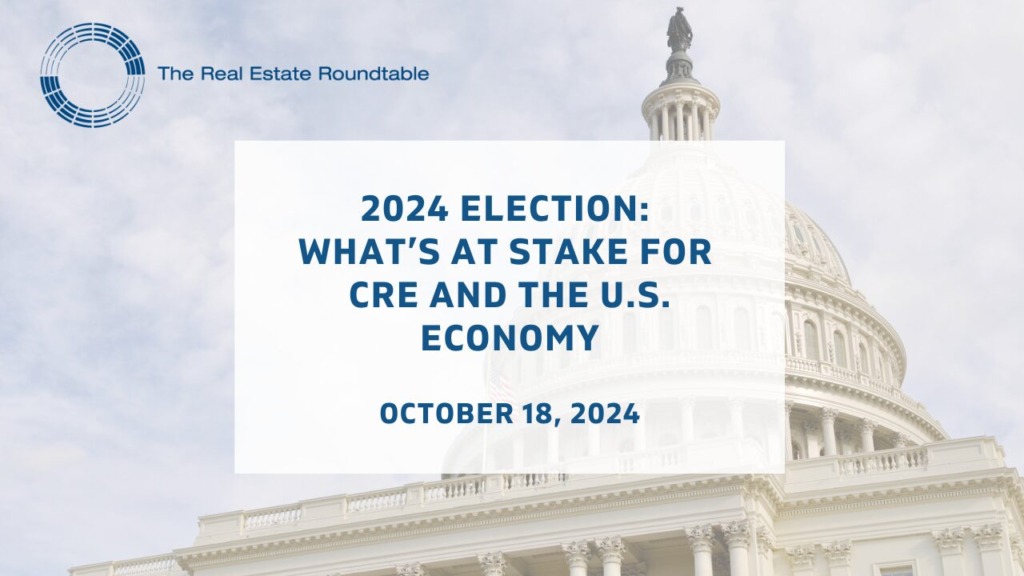
The 2024 election cycle concluded this week, with Donald J. Trump elected as President of the United States. The Roundtable congratulated the President-elect and the newly elected members of Congress. As the nation transitions to new leadership, The Roundtable is looking forward to collaborating with the new administration and Congress on policies critical to the economy, jobs, housing, and the health of real estate markets.
Election Results
- At the time the election was called, President-elect Trump had received 295 electoral votes compared to Vice President Harris’ 226. Trump also took the lead in the popular vote, with 72,773,748 votes compared to Harris’ 68,123,125. (The New York Times, Nov. 7)
- On the Congressional front, the Republican party took control of the Senate with 53 seats. Neither party has reached the necessary 218 seats to secure a majority in the House, but Republicans are in the lead with 211 seats. (AP News, Nov. 7)
Focused Hard Work Ahead Regarding Tax Legislation, Deregulation, and Housing Policy Shifts

- Donald Trump’s victory in the presidential election, Republicans’ victory in the Senate, and the likely Republican House majority dramatically reshuffle the dynamics for policy debates on key issues related to real estate. The Roundtable’s initial thoughts on how the election results impact our priorities, strategy and outlook include:
- Tax Policy Extensions and New Proposals: The incoming administration is expected to extend 2017 tax cuts, restore bonus depreciation, and support Opportunity Zone incentives. New pro-growth tax measures could also gain traction.
- Deregulation in Energy and Financial Services: Deregulatory shifts may impact climate and financial services regulations, prioritizing oil and gas development, easing bank regulatory and SEC, HUD, and FHFA oversight. Federal rollbacks could increase regulatory challenges across states as they implement varying climate standards. Ensuring grid reliability could become an even more prominent issue in the energy policy arena.
- Focus on Credit Markets and Housing: Anticipated policy objectives include reducing mortgage rates, revisiting Fannie Mae and Freddie Mac conservatorship, and reducing housing costs by cutting regulatory barriers. Potential Treasury appointments reflect a push toward expanded credit access and reduced regulatory burden.
Roundtable Statement

Earlier this week, Roundtable President and CEO Jeffrey D. DeBoer issued a statement congratulating President-elect Trump and pledging to work with the new administration and Congress on pressing commercial real estate issues.
“We look forward to working with the President-elect and his team to advance policies that will expand the nation’s economy, boost job creation, increase the supply and affordability of housing, and address the many important national policy issues related to constructing, financing and maintaining modern real estate, work, living, and recreational buildings.
Strong real estate markets provide millions of American jobs, support strong local budgets, and help millions of people plan for retirement through their pension and retirement savings investments in real estate.
The strength of real estate and the benefits the industry provides to all Americans, depends on fair, consistent, and forward-looking policies at all levels of government.
Real estate public policies are nonpartisan. The Real Estate Roundtable supports policies based on objective economic principles that are responsive to changing economic cycles and sensitive to societal demands.
Tax and financial regulatory reform, housing investment, immigration issues, energy policy, and physical and cyber security each present opportunities to advance the economy and stability of U.S. real estate markets.
We are excited to offer our support, expertise and assistance to President-elect Trump and the new Congress. We are honored to contribute meaningfully to the strength and prosperity of our nation,” said DeBoer.


